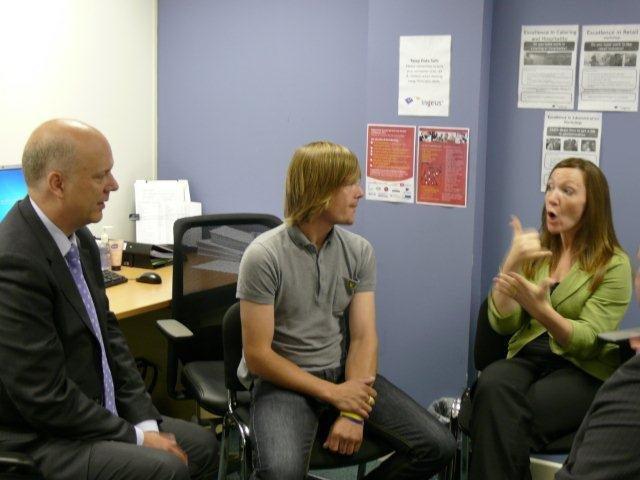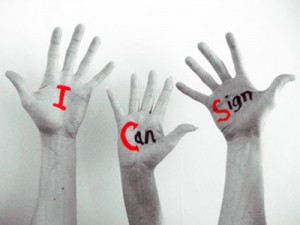“Sara Jae’s re-blog on the issues of unmoderated deaf support is a blog well worth reading.
Although dated a year ago, little has changed, and the issue seems to be still unaddressed and deteriorating..
We suspect (And hope) priorities are still in favour of the deaf child being properly cared for and support monitored, but the adult population is wide open to abuses and still left to own devices..
Indeed in many respects contributing to own abuses by accepting unqualified support. That support can come via own family, or friends, who, acting with best intentions, in reality disempower the deaf because they shift deaf reliance on professional interpreter or trained support, onto them, so family/friends become unofficial carers without qualifications or a wage.
Where their signing knowledge is good with their deaf relative most have no qualifications when the talk gets technical/medical, then the areas become blurred, and familiarity leads to contempt and decision-making going out of the deaf person’s hands. A number can rapidly become out of their depth and leave the deaf person to manage alone.
Maybe the support does not have enough communication as per a terp would, and certainly no neutrality, then it can become a real risk to a deaf person’s health and well-being. Deaf seem determined to oppose any ban on family help even those with no signing qualifications… so accept that risk, this can undermine any attempt to monitor support properly, or establish an adequate care system. Of course set bad examples for younger deaf to follow.
There is a huge rise in ‘Mentors’ (Nobody know what qualifications they are supposed to have other than they sign), and ‘carers’ (With few communication qualifications), and CSW’s and others who are under little monitoring at all, as regards to standards of care or help. How do you monitor, when no norm has been established ?
The basic CSW qualifications seem rather thin. There are examples of BSL Interpreters who go over and above their remit to help the deaf client. In effect acting as a bona-fide social worker in some respects and as a real friend. This is wrong of course, in a professional sense, and in the sense it compromises the neutral nature of signed support.
Then, BSL Interpreters are in breach of their professional standard, and become vulnerable to claims they are doing that to maintain steady work for themselves by allowing that reliance. It’s already well-known in deaf areas, many deaf have a ‘preference’ for a particular interpreter as a result.
The issue, is who monitors to ensure support for deaf people is maintaining integrity, or neutrality ? ATR has covered a number of areas of deaf mentoring where abuses happened to the deaf client and no monitoring of standards was apparent. With local authorities or Social Services ‘rubber-stamping’ second-hand support, no way to complain either. These areas may well be legally obliged to provide support, but , THEY choose who that is. Some may oblige by providing who you want, others may just say they have met the letter of the law and take it or leave it. If no availability isn’t there you can’t insist. Interpreters are busy and scarce people.
Also, the Sign language bodies dither over monitoring, because they say many BSL interpreters are not members of their agencies or bodies, more in fact are completely free-lance and operate as they want to a great extent. Also the best they can do is stop an errant terp quoting them. The BSL tuition system is a case in point, where few standards are really maintained. LEA classes are very questionable, and the ‘anything goes’ approach left to the unmonitored tutors leaves a lot to be desired. Some deaf ‘cultural centres’ were accused of such bias, and some did not belong TO the deaf community and were BSL for cash areas.
Charities also came in for considerable criticism as they tried to plug the leaking support gaps for deaf, by lowering own standards of care qualifications, and of communication. Social Services via Local Authorities are being seen to ‘shop around’ for the cheapest care they can find with the basics of qualifications, and care is applied on a strict time-limiting basis. 2 Local Authorities approached a class for BSL learners offering learners the job, because the approved BSL Interpreter system of trained professionals was ‘too expensive.’ This included work in legal, banking, and medical situations, highly skilled interpreting and sensitive areas.
E.G. Today a care worker attended a client in Wales to find an 92 yr old client collapsed on the floor. She contacted emergency services, and asked her agency if she could forgo a visit to the next client, as they can only offer care on a 15 minute visit basis, (Or someone else could attend in her place), so she could wait until medical help arrived and monitor the client till they arrive. She was told NO, she had to leave that unconscious client on the floor and go to the next allotted client or face losing her job. So she left the client unconscious on the floor and the front door open for the emergency services.
The problem with deaf care (Let’s call it what it is, as it isn’t empowerment since empowerment suggests choice), is the fact standards are almost low or non-extant in many cases because the cost of professional support to the deaf is too high. This leaves the doors wide open to staff who really do not know what they are doing most of the time, or understand what a deaf client is saying. It’s caused deaths in Wales to older deaf people. Still none of the deaf or associated charities will demand higher standards, from themselves, or, from others on the deaf behalf.
Mostly they won’t demand these standards because they supply the staff, and if more professional qualifications are demanded, they cannot supply that need. Meanwhile deaf are being sold out and left in the hands of people who don’t have the wherewithal to help them. IN part this tends to demoralise deaf who feel why bother to ask for help at all? The system seems to work on the basis ‘Anyone with ears can support the deaf..’
God help them. Is deaf support just too expensive to be practical? certainly state welfare agencies now think so… and won’t fund it any more by cutting off the financial means to buy it in. In order to address what is going on, a ban on private agencies/charities and care has to be invoked at least until a set of care norms and the means to monitor them exists.”
By Mervyn James, who can also be found ‘At the rim’…



You must be logged in to post a comment.